#Authorized King James Bible
Text

Elijah Flees to Horeb
1 And Ahab told Jezebel all that Elijah had done, and withal how he had slain all the prophets with the sword. 2 Then Jezebel sent a messenger unto Elijah, saying, So let the gods do to me, and more also, if I make not thy life as the life of one of them by to morrow about this time. 3 And when he saw that, he arose, and went for his life, and came to Beer-sheba, which belongeth to Judah, and left his servant there.
4 But he himself went a day’s journey into the wilderness, and came and sat down under a juniper tree: and he requested for himself that he might die; and said, It is enough; now, O Lord, take away my life; for I am not better than my fathers. 5 And as he lay and slept under a juniper tree, behold, then an angel touched him, and said unto him, Arise and eat. 6 And he looked, and, behold, there was a cake baken on the coals, and a cruse of water at his head. And he did eat and drink, and laid him down again. 7 And the angel of the Lord came again the second time, and touched him, and said, Arise and eat; because the journey is too great for thee. 8 And he arose, and did eat and drink, and went in the strength of that meat forty days and forty nights unto Horeb the mount of God.
9 And he came thither unto a cave, and lodged there; and, behold, the word of the Lord came to him, and he said unto him, What doest thou here, Elijah? 10 And he said, I have been very jealous for the Lord God of hosts: for the children of Israel have forsaken thy covenant, thrown down thine altars, and slain thy prophets with the sword; and I, even I only, am left; and they seek my life, to take it away. 11 And he said, Go forth, and stand upon the mount before the Lord. And, behold, the Lord passed by, and a great and strong wind rent the mountains, and brake in pieces the rocks before the Lord; but the Lord was not in the wind: and after the wind an earthquake; but the Lord was not in the earthquake: 12 and after the earthquake a fire; but the Lord was not in the fire: and after the fire a still small voice. 13 And it was so, when Elijah heard it, that he wrapped his face in his mantle, and went out, and stood in the entering in of the cave. And, behold, there came a voice unto him, and said, What doest thou here, Elijah? 14 And he said, I have been very jealous for the Lord God of hosts: because the children of Israel have forsaken thy covenant, thrown down thine altars, and slain thy prophets with the sword; and I, even I only, am left; and they seek my life, to take it away. 15 And the Lord said unto him, Go, return on thy way to the wilderness of Damascus: and when thou comest, anoint Hazael to be king over Syria: 16 and Jehu the son of Nimshi shalt thou anoint to be king over Israel: and Elisha the son of Shaphat of Abel-meholah shalt thou anoint to be prophet in thy room. 17 And it shall come to pass, that him that escapeth the sword of Hazael shall Jehu slay: and him that escapeth from the sword of Jehu shall Elisha slay. 18 Yet I have left me seven thousand in Israel, all the knees which have not bowed unto Baal, and every mouth which hath not kissed him.
19 So he departed thence, and found Elisha the son of Shaphat, who was plowing with twelve yoke of oxen before him, and he with the twelfth: and Elijah passed by him, and cast his mantle upon him. 20 And he left the oxen, and ran after Elijah, and said, Let me, I pray thee, kiss my father and my mother, and then I will follow thee. And he said unto him, Go back again: for what have I done to thee? 21 And he returned back from him, and took a yoke of oxen, and slew them, and boiled their flesh with the instruments of the oxen, and gave unto the people, and they did eat. Then he arose, and went after Elijah, and ministered unto him.
— 1 Kings 19 | Authorized King James Version (AKJV)
The Holy Bible: Authorized King James Version; Cambridge University Press, the Crown’s patentee in the UK. All rights reserved.
Cross References: Hebrews 11:34; Hebrews 11:37-38; 1 Kings 18:22; 1 Kings 18:30; 1 Kings 18:40; 2 Kings 2:8; 2 Kings 8:8; 2 Kings 8:12-13; 2 Kings 9:2; Ruth 1:17; 1 Samuel 6:14; 1 Samuel 11:5; 1 Samuel 18:19; 1 Samuel 28:14; 2 Samuel 3:9; 2 Samuel 24:22 Genesis 16:8; Genesis 21:14; Genesis 21:31; Genesis 28:12; Numbers 11:15; Job 4:6; Job 6:9; Zechariah 4:1; Zechariah 4:6; Matthew 4:2; Matthew 26:7; Luke 4:2; Exodus 3:1; Exodus 3:6; Exodus 19:20; Exodus 20:5; Exodus 24:12; Romans 11:3-4; Judges 7:22; Daniel 3:18; Hosea 13:2; Luke 9:61-62; Acts 20:37
#Ahab#Jezebel threatens Elijah#Elijah flees#wilderness#God#encouragement#1 Kings 19#Book of First Kings#Old Testament#AKJV#Authorized King James Bible#Cambridge University Press
3 notes
·
View notes
Photo

“The oldest known surviving Bible, the Codex Sinaiticus, was written over 300 years after the death of Jesus and contains both the Old and New Testaments. There are nearly 15,000 differences between it and today's King James version. With Emperor Constantine's adding chunks and yanking chunks and King James' changing large chunks here and there, this is the Xtian version of God's unquestionable Truth.”
#Codex Sinaiticus#christianity#bible#bible study#old testament#new testament#forgery#Forged: Writing in the Name of God#Emperor Constantine#King James bible#anonymous authors#word of god#god's word#religion#religion is a mental illness
139 notes
·
View notes
Text

remember this nerd shit
9 notes
·
View notes
Quote
And they continued stedfastly in the apostles' doctrine and fellowship, and in breaking of bread, and in prayers. And fear came upon every soul: and many wonders and signs were done by the apostles.
Acts 2:42-43 Authorized KJV (2022)
#bible verse#scripture#acts 2#the soul#early church#twelve disciples#apostles#faithfulness#community#sharing#prayer#bread#communion#fear#wonders#miracles#signs#authorized king james version
17 notes
·
View notes
Text
Ephesians Bible: Wherefore...
Illuminated Manuscript, The Rochester Bible, Walters Art Museum Ms. W.18, fol.199r (Photo credit: Walters Art Museum Illuminated Manuscripts)
“Wherefore putting away lying, speak every man truth with his neighbour for we are members one of another.”
—Ephesians Bible.
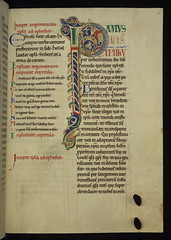
View On WordPress
#Authorized King James Version#Bible#Bible Study#Christ#Christianity#Ephesians Bible#Epistle to the Ephesians#god#Religion and Spirituality
1 note
·
View note
Text
Magnum Opus or Great Work: Alchemical Codes in "Harry Potter"
"I've never wanted to be a witch, but an alchemist, now that's a different matter. To invent this wizard world, I've learned a ridiculous amount about alchemy." JKR. By the way, it seems JKR never became an alchemist because you can't be that evil an alchemist, Joanne. Something went wrong.
The first part about Lily and James
Voldemort – an occult alchemist, Lucifer. Snape – a Seeker who chose the wrong Path. Dumbledore – Keeper of the Tower. Hermione – Hermes Trismegistus. Harry, Hermione and Ron – the three principles for creating the Philosopher's Stone.
Alchemy is the universal path of spiritual transformation. In a literal sense, universal, this code is practically everywhere–from ancient myths and the Bible to the philosophy of Nietzsche (though in his understanding) and Jung's books. Harry Potter himself is a complete alchemist's path, but there's also a well-displayed second path–the path of the occult alchemist.
True alchemy tells us that God is in everything, like a seed present in every person. Through alchemical transformation, a person can be reborn – and become golden, divine, immortal.
Many famous people were fascinated by these ideas – from Newton to Goethe, from Walter to Mozart. Yes, Walter and Mozart were freemasons, but freemasonry is built on the Magnum Opus, it's its foundation. Who has seen the opera The Magic Flute? A completely masonic opera: the surface layer was for the people, and the deeper layer – for the spiritual elite of that time. In this opera, the power of love transforms people and makes them divine. Oh, it seems to resemble Harry Potter, hehe... Harry Potter also has two layers – one as a fairytale about a wizard for teenagers, the other – for those who can "feel" the symbols, even without knowing them.
Each symbol can be interpreted in several ways, that's the complexity of alchemical symbolism. For example, Albus Dumbledore. He symbolizes (in JKR's own words) Spirit ( he's white), and Rubeus Hagrid – Soul (red) – and they're both like two fatherly figures for Harry, distant and warm, judicious and understanding. But all this is at the character level. Dumbledore has other meanings – much more important ones. As I've said before, the symbolic level and the character level are different levels. In interpreting symbols, you don't need to interpret every line, you need to take the context as a whole. Characters operate on one level, symbols – on another.
So, alchemy is an extension of the universal idea – to be reborn, you need to "die." Like Jesus died on the cross, Orpheus on the banks of the River Gebre, and Osiris in the coffin prepared by Typhon, in alchemy, until all the elements (parts of the old personality) die, the work cannot be completed.
The stages of this alchemical process can be traced in the lives of almost all world "heroes" and in the mythology and legends of many cultures. This is a universal code.
“Very truly I tell you, no one can see the kingdom of God unless they are born again” John 3:3
Alchemy proclaims that without decomposition, the Great Work cannot be accomplished.
The past Self dies on the cross and in the retorts and becomes black during decomposition. The new Self rises from hell, like a phoenix. The phoenix is a pure alchemical symbol.
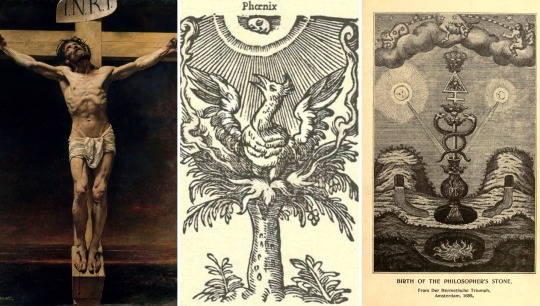
This is the creation of the Philosopher's Stone.
It is symbolically described in "The Chymical Wedding of Christian Rosenkreutz". The book presents an allegorical story divided into "Seven Days" or "Seven Journeys," which tells how its author, Christian Rosenkreutz, was invited to a castle full of wonders to help with the "Chymical Wedding" of the king and queen. Harry also receives a letter in a storm (like Rosenkreutz) and goes to the castle for 7 years, chooses one of the four paths (Gryffindor), and so on.
Alchemists called the creation of the Philosopher's Stone the Great Work – Opus Magnum. This process consisted of three stages: decomposition (nigredo), rebirth (albedo), and final perfection (rubedo). Each of these stages corresponded to a specific colour: black, white and red.
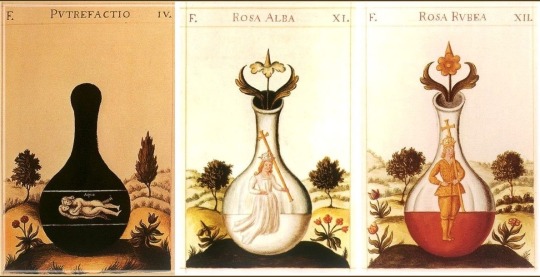
Nigredo. Albedo. Rubedo.
In Harry Potter, these stages correspond to Sirius Black, Albus (white) Dumbledore, and Rubeus (red) Hagrid. The end of each stage is marked by their death. In the seventh book, it's Hagrid who carries the "dead" Harry.
There is a fundamental difference between "true alchemists" and "occult alchemist."
Tom Riddle is an occult alchemist. For him, the Great Work is also self-creation, but what kind? For him, it is complete mastery of his abilities and his future, and especially the complete liberation of his will.
Tom is a will, but his will not submissive to the will of God. It's a Luciferian will. The will of a fallen angel who began to oppose his own free will to the influence of Divine Love-Light. Instead, he sought and loved his own power outside Divinity, in himself.
"Better to reign in Hell, than serve in Heaven" John Milton, "Paradise Lost"
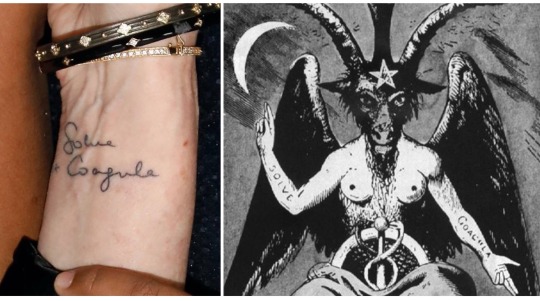
Baphomet, or the Sabbatic Goat, drawing by Eliphas Levi, on its hands are inscriptions "Solve et Coagula." This is an alchemical principle. JKR, by the way, also has such a tattoo.
In occultism, it is believed that magic is control of one's will, and a will can control matter. After all, what did his followers choose for their motto? Magic is Might. Harry never defeated Voldemort with such magic. Because he doesn't need it.
What does Tom boast about? Tom boasts that he has mastered the deepest depths of dark magic. He went so far in it as no one before. Dark magic requires an iron will, and Tom achieved incredible heights in it. He even achieved immortality in this material universe, literally cursing his soul! Only Tom doesn't understand that Dumbledore (a true alchemist) is not interested in all this. Because true immortality is not there. True transformation is not there. Because their paths are completely different – Dumbledore is going to the "God and divine immortality," and Tom is going to "material immortality."
In general, fans of occult alchemy, the Left-Hand Path, and Nietzschean philosophy probably consider Tom a much more interesting character because here he is – the king of matter, a man of incredible will and strength who destroys the slave Christian morality and proclaims that God is dead, long live the Übermensch (homo superior)! (Nietzsche would have been proud of him…) By the way, Bellatrix is most likely symbolically – Lilith, Adam's first wife according to Kabbalistic apocrypha, who rebelled against Adam. God created them equal, and Adam wanted to have power over Lilith... In short, Lilith is the first feminist in human history, hehe.
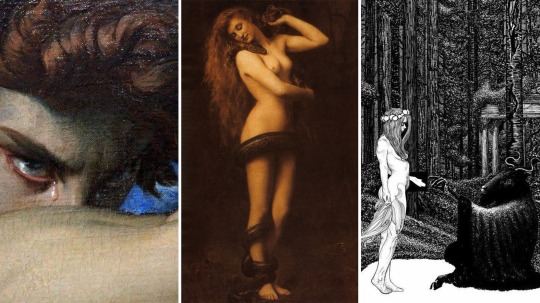
The Fallen Angel by Alexandre Cabanel. Lilith.
In short, Tom Riddle is such an adept of broken alchemy. Where Tom is his own personal will, Harry is Faith and the will of the Spirit. Harry is also very strong-willed, but his will is different, it's not individualistic. It's a will of sacrifice, a will of love, a will of mercy, a will of trust. The main theme of the seventh book is a crisis of faith. And what kind of will does one need to show to continue the quest for Horcruxes and not go for the Deathly Hallows? Simply put, the will of Harry and Tom is completely different.
And Tom will never understand this. He's an individualist. He's a Nietzschean Übermensch. He's reached the limits of human capabilities. But for what? From dust you are and to dust you shall return, Tom...
Severus Snape — a Seaker who chose the wrong Path
And Snape, by the way, initially turns away from Lily (Lily is love of God, represented in the world). Because he's obsessed with becoming dark magic, his ego and desire for secret knowledge and being proud are very great.
Btw, Lily is a mudblood. In the sense that God is not in shining beautiful armor. This is Lucifer's mask – to be pure, to shine, to sparkle. But the real God can be found by seeking, under the feet of the poorest and "dirtiest" person. After all, for God, everyone is equal. It's the Devil who divides.
And pure-bloods, for example, the Blacks, are "false purity." Luciferian purity. Material purity, purity of shining gold. It's division. And where there's division – there's the Devil.
In short, Snape turns away from Lily because this path is difficult, he doesn't understand how to approach her, he already uses dark magic, has a lot of knowledge, and delves into various secrets, and shows what "bad" paths other seekers (the Marauders) take... (The seeker is not my term, it's from the Rosicrucian manifesto, alchemists call themselves seekers) But Lily still refuses to unite Spirit and Soul. And he calls her a "mudblood," insulting her. For Lily, this is a sign that this soul is almost lost. And there's no sincere regret in him when he asks for forgiveness. He asks her to forgive him, but his soul is still on the old Path. Lily isn't angry with him, it's not about anger or offense. Snape's soul is almost lost at this moment, closed to the divine spark and love. After all, for love to enter your heart, you first need to open yourself to it.
Only when Snape sees true face of Tom's "alchemy," in which Tom is ready to kill Love, the divine spark, essentially kill God in the souls of all people, then Snape, as a real Seeker, realizes that he's going the wrong way... And he runs to the main Alchemist, Dumbledore, to ask to preserve this love, this manifestation of God on earth.
But you can't preserve it without preserving the seeker of the right Path in your soul (James) and without preserving the possibility of the emergence of the transformed soul (Harry).
This is a very important moment, not only because you can't kill people in principle. Dumbledore literally tells him that you can't save love of God, the divine spark in your soul, if you kill in yourself the one who reaches out to God (the deer) and if you kill the POSSIBILITY of becoming this new transformed soul (Harry).
For Snape, this becomes a turning point, and he decides to switch sides to true alchemy. Dumbledore asks in return for Snape's soul, but not in the sense that the Devil demands it, he asks for loyalty to the Path. Below I'll explain the symbolism of Dumbledore and what he means in terms of alchemical symbolism (I don’t think he is God).
Snape becomes loyal to Dumbledore. But Lily is killed, as is James. The world, despite the fact that Voldemort temporarily goes into hibernation (and the Savior is alive), plunges into despair. Sirius (as a divine symbol of light) is in captivity, Remus (a symbol of a seeker with a "good but not brave" soul) is somewhere wandering the world, and Harry lives very poorly with the Dursleys... Harry doesn't know any God, and the seeker in him is also "dead". And Voldemort will soon rise again, he's just gathering strength.
Harry's path is the path of returning to God through Mother of God (Theotokos). Because it is Mother of God who is the true Spirit. That's why he meets Lily only at the end of the seventh book, when he's almost completed the alchemical transformation. For Christians, this is heresy, but for alchemists, it's not. The Son and Mother of God are one whole. The Virgin Mary is part of the Trinity, because only through the spiritual unity of the Mother and the Son is the salvation of humanity possible.
And who does he meet her through? Through Snape. Who dedicated his entire life to transforming his Soul, merging it with the Spirit, ultimately coming to God.
He spent his whole life hating James, as a Seeker of a different kind, not like him—Snape always leaned a bit towards Nietzschean stories. And James always hated Dark Magic and all dark things (although this doesn't make the souls of this type much better, they can also be egocentric). Snape teaches Potions, he knows how to bottle up Love, Death and Luck... So much power, so much pride in this...
Recently, I reposted a very interesting post. Snape wanted to recover his soul, because he was guilty of Lily's death. A very beautiful meta, but I see a bit different alchemical meaning. His soul is broken not only because Lily partly died because of him. His soul is broken overall because of the Path he chose - that of an occult alchemist, and he remains a "spy" to the end of his days, playing two roles, constantly "here and there". He dies at the hands of his former master.
Snape takes Lily's letter because he needs Lily's love (like people wear crosses), while there isn't enough understanding of where to go (Dumbledore is already dead)
Snape always yearned for Lily. And Dumbledore asks for us, the readers: "After all this time?" And Snape answers for us "Always." You must love God always. And that is salvation for the soul.

In general, Snape only understands towards the end that you cannot love Lily without Harry and even James. Only one Path leads to Lily - the same as James’s path. The path of Ego, pride, thirst for power, secret knowledge, occultism, malice, hatred must finally dissolve. Snape fully exposes himself to Harry, although he shouldn't have (he should only pass on information about death), revealing the good (and the bad) that he always hid. His revelation to him speaks of his complete acceptance. He shows him his soul, literally bowing his head to him - here I am, here is my soul, in some things I have no excuse, sometimes I have justification, but I've been seeking God, seeking love all my life.
Will you accept my wounded soul?
This is confession. The realest confession.
And Harry accepts. Of course, Harry accepts. He looks at him with Lily's eyes.
Because no matter how "bad" you are, if you truly love God in your soul, if you truly seek Him, there will always be a place for you in the City of God. Snape is the constantly replayed plot of the Prodigal Son's return.
At this moment, all the "black" in Snape dies – the nigredo. Tears - the white stage, purification – the albedo stage, purification. Blood – naturally, the red stage. The alchemical transformation for Snape is complete.
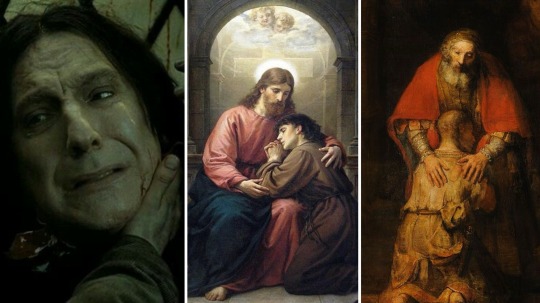
(But geniuses from TikTok will still say that Harry shouldn't have named his son Albus Severus, because Snape was baaaad. Ofc he was bad sometimes, that's the point!)
Dumbledore is the embodied Path and Plan
As I mentioned before, Dumbledore asks for Snape's soul in return, but not in the sense that the Devil demands it, he asks for loyalty to the alchemical Path.
Dumbledore, as an alchemist, besides embodying the completion of the albedo stage for Harry with his death, is also the embodied Path. Dumbledore is the highest Guardian of the Tower, who watches over the Paths of others, he is the Man of Spirit, he is the Principle, he is the Master. What is the difference between Dumbledore and Lily? Lily is a more important symbol, she is like pure divine power, God = love, as in what all souls dissolve. Dumbledore, on the other hand, is the Guardian of the Path through which everyone must pass. In short, Lily is the answer to the question "where", and Dumbledore is the "how". And Dumbledore is just a man who also underwent his alchemical transformation and who can also succumb to temptation. But Dumbledore is not GOD, imo. To personify God in a book is too much (even for me, although I’m not religious at all). I don’t like the idea of him being God and... really, where? God is transcendent and pure divine love emanates from Lily that’s why she almost an empty canvas. Dumbledore is a principle. He is the answer to the question "HOW". That's why he asks to believe in him, believe in the ALCHEMICAL PATH AND PLAN. FOLLOW THIS PLAN TO THE END. Ascend the tower, as I once ascended it. After all, he lives up there in the tower. He observes.

For Snape, Dumbledore is so important because Dumbledore is the Path, a new Path that he did not have. And Dumbledore's death is so important for everyone because now no one points them towards the Path. But they must find this Path within themselves. Because the answers are inside them. You cannot become a true Alchemist if you constantly rely on external help. It's time to see the Path independently.
"You must kill me."
There was a long silence, broken only by an odd clicking noise. Fawkes the phoenix was gnawing a bit of cuttlebone. (HP and DH)
After Dumbledore says that Snape must kill him, there is silence and a very clear symbol - the phoenix and the bone. It's time for their souls to go independently, to eat away all the old to come to rebirth. Meanwhile, they also need to save Draco, who, by "Lucifer's" order, is about to kill the Path (although you can't outplay God's plan...). And then Dumbledore reveals that Harry must die.
This shocks Snape. Like any alchemist on the Path. How so, to die? After all, we all do everything to become closer to God, to immortality, and you say – just die? What kind of Path is this?
"I thought…all these years…that we were protecting him for her. For Lily.”
After all, we were protecting Harry for Lily, because as I've already said, only through the spiritual unity of the Mother and the Son is the salvation of humanity possible. Snape is protecting the son for the mother, and Dumbledore wants to kill him? For what?
Simply put, Snape doesn't understand that no one can save Harry until he dies and is reborn. It's painful, but all heroes go through this path for rebirth.
Dumbledore knows that there is a "seed" of "evil" in Harry, as in any of us. After the fall, we all carry Luciferian part within us. This is the last thing that must die in Harry, and he himself must die for it.
No one promised that the path of the alchemist would be easy. It's understandable why not everyone loves Dumbledore, he seems too cold and manipulative, but there is no other way for Harry on the symbolic level.
The Great Work
There are three stages of the Great Work: decomposition (nigredo), purification (albedo) and ultimate perfection (rubedo). These stages for Harry culminate in the deaths of Sirius Black, Albus Dumbledore, and his own death, where he is carried out of the forest by Rubeus Hagrid.
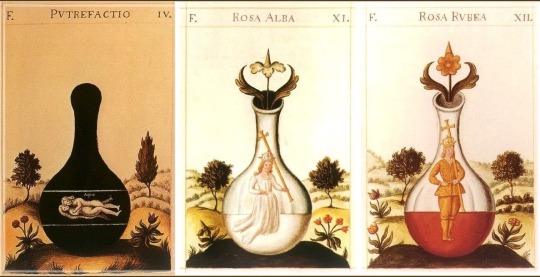
And the result of his alchemical work should be Rebis — essentially the alchemical philosopher's stone, an androgynous being. In the collection of dialogues attributed to Hermes Trismegistus, God is depicted as androgynous. (Hermes Trismegistus is essentially the one who created the corpus of Hermetic texts).
Rebis is the unity of opposites. Day and night, Man and Woman, Good and Evil, Light and Darkness. All is one. There is no division. The wholeness of God. After the fall, we are all divided. And after the alchemical transformation, we can finally become whole and find ourselves and God.
In the form of merged men and women, sometimes depicted as the Virgin Mary and Christ, because They are one whole. As I have already said, for many alchemists, the Virgin Mary is part of the Trinity because only through the spiritual unity of the Mother and the Son was the redemption of original sin made possible. As I have already said, although Harry suffers more for James (his father turned out not to be as ideal as he thought), Lily is the main symbol in "Harry Potter".

The Nigredo stage literally means "blackness" - it signifies complete breakdown, decay, descent into the underworld, the trance of grief. It's a descent into the deepest fears, disbelief, denial, loss of self, anger, aggression. And through this - a return to the prima materia. This is what happens to Harry, "The Order of the Phoenix" is a very dark and depressing book, and with Sirius's death, this stage for Harry is completed. Sirius himself also undergoes transformations, but about this in the next part. The nigredo stage, during which a person's ego dissolves, is agonizing but necessary for further development. After the "I" meets its "shadow" and disintegrates into parts, it will need to be purified and recreated.

Albedo ("whiteness") symbolizes purification, transition to another world, change of life priorities, awakening, enlightenment. In alchemy, the transition from nigredo to albedo is achieved through the process of washing. The whole sixth book is misty, "white", "wet". "Washing" (albutio, baptisma) directly leads to whiteness (albedo). Purification. It's also silver, a lunar state. In Harry Potter, there is a character named Luna, which means moon in Latin. In different parts of the books, Luna also symbolizes this stage. With Dumbledore's death this stage for Harry completed.

Rubedo ("redness") - the final stage of the alchemical Great Work. The alchemist must establish a kind of sacrificial relationship with his inner essence. At the final stage, the so-called "alchemical marriage" takes place: the marriage of the Red King and the White Queen - Soul and Spirit. Harry (soul) and Lily (spirit) are united. With Hagrid carrying Harry this stage for Harry completed.

Bu the way, the Golden Snitch is an alchemical symbol also.
Firstly, Harry's position is called the Seeker. Alchemists also called themselves that. Secondly, the winged disc is a very ancient symbol, meaning the sun (God) and immortality.
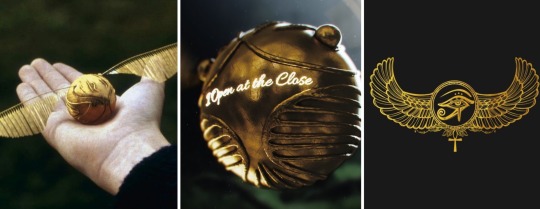
The Snitch reveals to him the Resurrection Stone, and Harry "encounters" his main symbols, but the main one is Lily. It is her he asks not to leave him.
Harry's death here is read by everyone as the well-known plot of Christ's crucifixion. The path to this death is also a reference to the agony of Jesus in the Garden of Gethsemane before the Crucifixion. After all, Harry also wanted to end up somewhere, but Hogwarts is his home, and he accepts his fate.
My Father! all things are possible for Thee: take this cup of suffering away from me: and yet not what I desire, but what Thou desirest. Mark 14:36
He wanted to be stopped, to be dragged back, to be sent back home... But he was home.

Lily's Eyes
To be honest, I can assume that her green eyes was chosen at random. But what if they weren't? Her green eyes may seem illogical, as this is the colour of the snake, the colour of Slytherin, the colour of evil. But this is the occult Luciferian snake, the erroneous snake. Originally, green also dates back to Hermes Trismegistus – the god who gave the knowledge of alchemy. The most famous of the old hermetic-alchemical texts is inscribed on the "Emerald Tablet". According to legend, this document was left by Hermes Trismegistus on a plate of emerald in an Egyptian temple.
"The Emerald Tablet" is very important for alchemists." According to legend, a large emerald fell to the earth from Lucifer's head when he was cast out of heaven. From the same emerald that fell from the crown of the fallen Lucifer, angels made the Holy Grail (which is also the philosopher's stone, and the Snitch...). Emerald is a sacred green stone, and the heavenly divine world - the homeland of the emerald - a precious stone in which information about the heavenly homeland is encoded.
There is also the Ouroboros - a snake that devours its own tail - a symbol of infinity and immortality.
And the Snitch, which is a reflection of Hermes Trismegistus' staff (which has two battling snakes - two opposites, Spirit and Soul, Good and Evil and so on, and Hermes establishes unity between them with his staff).
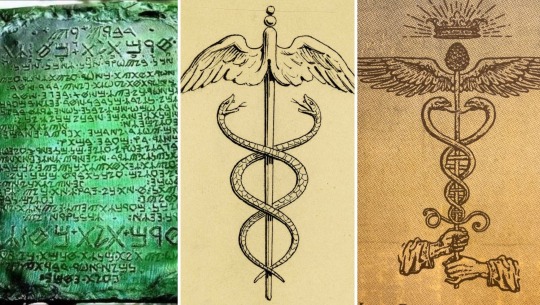
Occultists, of course, interpret these symbols in their own way.
Hermione is Hermes Trismegistus. Mercury. Ron — Sulphur. Harry— Salt.
Hermione (Ἑρμιόνη [hermi. ónɛː]) is a feminine given name derived from the Greek messenger god Hermes. As I said, Hermes Trismegistus is the main figure of Hermetic teaching, he is also the one who predicted the coming of the Savior (traditional Christianity should not be confused with Gnostic teachings, the Church has always been against Gnosticism). In addition, Hermes is Mercury, and that is knowledge. Hermes Trismegistus shares "secret knowledge" with the world, which forms the basis of many Gnostic directions - from alchemy to Kabbalah.
Hermione is a little alchemist, she shares knowledge. It is Hermione who insists on complete trust in Dumbledore, it is Hermione who often leads Harry in the right direction when Dumbledore is not around. It is through Dumbledore and Hermione that "moral lessons" are often sounded, which often seem completely out of place. Like when Dumbledore says that James would forgive Peter. At that moment, I always want to say, "Are you out of your mind?!" although I understand that it is described on a symbolic, not personal level.

Mercury (Hermione), Sulphur (Ron), and Salt (Harry) were necessary in the alchemical transformation and were the main components. To create the philosopher's stone, all three elements had to be combined, and Harry is next to them throughout all the books.
Both Hermione and Ron are equally important in Harry's development.

Mercury is the more fluid primary principle, more rational, the feminine principle, while Sulphur is dynamic, expansive, unstable, acidic, unifying, masculine, paternal, and fiery principle. Sulphur is emotional, it is desire and passionate impulse that motivates life. Sulphur is desire. And according to Jung's reflections, it can also be foul and dangerous. Complete transmutation depends on the correct application of this variable principle. Sulphur must be of quality for transmutation to occur. And Ron achieves this quality.
Also, in mystical alchemy, Sulphur is crystallized inspiration of Mercury (Mercury).
Mercury and Sulphur are simultaneously antagonists, like the male and female elements, but at the same time Sulphur is crystallized Mercury.
So I have always been and will always be for Romione! Hehe. They were made for each other!
And as for Salt - that's Harry. It's the body. Sometimes it is called earth and body, salt is the essential body (corpus).
Alchemists say that salt was the first substance created by fire, emanating from God. In salt, all creation is concentrated, in salt the beginning and the end of all things.
Salt is associated with the ultimate elevation of matter - with matter that has acquired consciousness, achieved through the unity of opposites, including the unity of fire and water, the unity of what is above and what is below. Salt is the ultimate Philosopher's Stone, representing transcendence and ultimate knowledge.
Thus, salt symbolizes consciousness (thoughts, feelings, material, etc.), which must be elevated through alchemical processes of dissolution and recrystallization. Well, that's Harry himself.

Just love this stupid moment
Well, that's it, I think I've said everything, and from the next part, we can move on to the Marauders themselves :D
#i'm wondering if anyone but me is even interested in this at all#harry potter meta#harry potter#hermione granger#ron weasley#pro ron weasley#rubeus hagrid#pro severus snape#pro albus dumbledore#pro romione#hp meta#severus snape meta#lily evans#tom riddle#voldemort#tom riddle meta#bellatrix lestrange
51 notes
·
View notes
Note
i was thinking about your whiteness post, and i wanna add how the idea of whiteness has lead to an almost bastardized and commercialized version of christianity
i don't celebrate christmas as a muslim because it's not my religious holiday to celebrate, but the amount of times people have said "you should still celebrate it! christmas is not religious holiday anymore!" is wild. like, that's your saviour? wdym christmas isn't a religious holiday???
it's not like this with other christian dominions, so i find it insane that the countries that scream about jesus all the time also treats his 'birthday' (there's so much debate on his date of birth) is just another holiday. the same thing for easter and i don't hear a word about lent either.
this probably isn't a new thought, but given that it's been another season of peoples pity because i don't celebrate christmas, its been on my mind.
anywho, i hope you're having a wonderful day!! <333
I 100% agree
I think much like a government, Christianity in the West has been co-opted by white supremacists.
I have a whole theory and special interest about it so let me soap box for a second.
Doing research even on the Bible the last few months and the KJV print is where that becomes obvious to me. Some of the wording changed to make obedience and subservience to the king a virtue. It linked holiness to serving someone other than God or yourself.
And that's not to say it didn't have issues before that or that the KJV is the sole cause (it is one of the most popular versions tho). But rather an observable point in history where we can see the Bible being wielded as a tool to make the masses more easily controlled.
It stopped being about God and spirituality a long time ago.
Further, the guy who translated it for King James is now considered the patriarch of puritanism. And that was caused when the King repudiated papal authority and transformed the Church of Rome into a state Church of England.
Yeah. They literally colonized the church.
See also:
The main difference between the Catholic Church and the Church of England is that Anglicans do not recognize the pope as the head of the Christian faith. Instead, the head of the Church of England is the British monarch.
The puritans who showed up on Turtle Island? Those were the same extremist puritans who didn't want to share church with Catholics that the king didn't want to deal with either. They thought the church being inclusive to Catholics was a religious affront and they wanted more reforms about it.
But then
Under Charles I, Calvinist teachings were undermined and bishops became less tolerant of Puritan views and more willing to enforce the use of controversial ceremonies. New controls were placed on Puritan preaching, and some ministers were suspended or removed from their livings. Increasingly, many Puritans concluded that they had no choice but to emigrate
Every time I hear "Starbucks cups are a christians tradition" I'm reminded of puritans screeching about how being inclusive of Catholics was a personal attack on their rights.
And when I see some megachurch doing this
Or when I hear about how Christianity feels more like a cult people want you to join and less like a peace driven religion about Jesus
Or when people have experiences like yours.
...it feels so obvious that focus of Western Christianity is actually about normalizing political ideas and they lure you into that by going "look how fun our parades are" and "aren't chocolate eggs fun?"
Jesus is a Trojan horse.
It's how you end up with so many "religious" people who'd willingly die for their country but shoot their neighbor. Conversely, it's how you end up with so many non-religious people saying it's not religious at all and bring people together actually.
Because its just parades.
Right?
#asked#answered#cultural Christianity#whiteness#colonization#i love asks like these#tysm for sending it
71 notes
·
View notes
Text
Eventually I'm gonna do a deep dive on every name in the Locked Tomb series but I've been sitting on this dissection of The Emperor's chosen name for a long time and I want to put it into the world. So, here it is.
The Emperor John Gaius, His Celestial Kindliness, the First Reborn, King of the Nine Renewals, Necromancer Divine, our Resurrector, and The Necrolord Prime
“NOTE: He’s just some guy, you know?
NOTE II: Gaius was not the name John was born with. He picked it for himself circa Y100 of his reign.”
These two names have so much potential meaning tied up in them so buckle up.
First, the literal translations. John is a derivative of the Biblical Hebrew Yohanan which is in turn derived from the Yehohanan, which means literally “Yahweh has been gracious.” Gaius is a Latin name that likely derives from the latin gaudere “to rejoice.” This more or less makes the name say “Huzzah! God has been good!” Now, there is one other tweak to this. Gaia is the Greek personification of the Earth (Terra is the Roman equivalent) and if you slapped the Latin masculine ending on it, it would become Gaius. This does provide a tie to the planet Earth in his name (which is far more obvious in Gideon’s name of Kiriona Gaia) and would make sense if he picked it as a memorial to the dead Earth to which he could never return.
Next, modern social interpretation. John for a long time held the title of “most common name in the English speaking world.” I believe it’s since been surpassed by James, but it’s still up there. Gaius, funnily enough, was the Ancient Roman equivalent of John. It was one of the most common given names for so long that it became semi-synonymous with saying “some guy” similar to the phrase “Tom, Dick, and Harry” or “don’t know him from Adam.” These two names make his name something like “John John” or “Jon Doe” or “James Q. Public.”
Next: the strictly biblical interpretation. The most obvious link here is to the book of the New Testament, John 3. This is a letter by one of the many biblical Johns to a man named Gaius concerning some pretty mundane church business of the time and thanking Gaius for looking after some poor missionaries. It’s honestly a supremely drab book of the bible and doesn’t really get into doctrine or legends or exciting apocalypse stuff. It’s just a letter from a church leader to a rich patron. If someone more versed in Biblical history and literature can shed some light on this book, I’d be very thankful.
Next: some name associations. Being two of the most common names in history, we kinda have a wealth of options to pick from. Saint John the Apostle was the one who actually walked with Jesus and was the brother of the Apostle James with whom they made up the Boanerges, the Sons of Thunder. John of Patmos was the likely author of the Book of Revelation and maybe the same as John the Apostle (but probably not.) The author who wrote about the apocalypse seems pretty fitting. Gaius was also the praenomen (given name) of the two Caesars responsible for the death of the Roman Republic and the birth of the Roman Empire: Gaius Julius Caesar and Gaius Octavius who became Caesar Augustus.
Julius Caesar is definitely the most well known Emperor of Rome/salad inventor and also second dictator for life (Sulla was the first so Caesar can’t take that title.) He was an incredibly popular general who was part of an alliance of three figures (him, Pompey, and Crassus) to increase their own power, wealth, and standing. When Crassus died, tensions formed between Pompey and Caesar until Pompey had the senate recall Caesar from his war in Gaul to be removed from command. Caesar knew this would lead to his execution at the hands of his rival so he made his own play, marching his troops into Rome (an act tantamount to sacrilege) to try and capture Pompey which spoiler he didn’t. It sparked a civil war that raged all the way around the Mediterranean for four years and left Caesar as the de facto ruler of the Roman Republic up until an unfortunate accident in the senate where he fell into knives 23 times. He had it coming. This idea of attacking his enemy before they have a chance to attack you only to have your enemy slip away is a notable parallel.
Gaius Octavius had been named as Caesar’s successor in his will and would go on to become the first proper Roman Emperor. He used the newfound power from his great-uncle’s death to form a new three person alliance (him, Lepidus, and Mark Antony) and hunt down Julius Caesar’s assassins and rake in treasure while cementing their political power. Surprise surprise though because Caesar Augustus (the name given Gaius Octavius after he became the Emperor) managed to politically, militarily, and psychologically out maneuver his two fellow rulers and within seven years he had metaphorically put Lepidus in the ground and literally put Mark Antony in the ground. Now, while in life Julius Caesar made a lot of moves to imply that he wanted to be the king of Rome, not least of which was modeling himself as descended from the gods and enshrining himself alongside them as equals. Augustus doubled down on this by starting a massive and complex propaganda machine to make himself equally divine, even within his own lifetime and immediately afterwards.
Both of these men led the Romans into civil wars that ravaged the empire. Both of them committed acts of sacrilege in the ancient world to further their political games of revenge. Both of them lied, cheated, stole, killed, and manipulated to gain more power and remake the world to be what they wanted. They were geniuses who may have even had good intentions and put an end to a long period of political instability, but through blood and steel and no small part vengeance.
Now I would be remiss if I didn’t address the elephant in the room that is Homestuck. I will say that my adoration of The Locked Tomb series has sent me down innumerable rabbit holes. I have researched paper manufacturing, the magnetic forces of Jupiter, Catholic prayers, polygenic phenotyping, Ancient Greek and Roman poetry, national anthems of nations of the world, and the psychology of Among Us. But the rabbit hole that is the MS Paint Adventures Wiki is one too daunting for even me. But in any case, I have no doubt that these characters sharing a name is no coincidence.
Lastly, the use of a Hebrew and Latin name makes this fascinating marriage of opposites. To massively understate it, Romans and Christians did not get along for a long time. Obviously now, the Catholic Church is seated in Rome, but for a BIG portion of the early Christian ministry, the Romans were the ones who captured them and set them on fire or crucified them or other fun and exciting means of execution. More than that, an apostle to Jesus’ monotheistic peace-loving and merciful message being linked with two deified and bloody conquerors of Ancient Rome does create this interesting tension. This tension is something very interesting in modern Catholicism as well as the Locked Tomb’s Empire.
#tlt#the locked tomb#gtn#gtn spoilers#gideon the ninth#harrow the ninth#htn#htn spoilers#nona the ninth#ntn#ntn spoilers#john gaius#the necrolord prime#the emperor undying#i dunno im fascinated by his name#like it is a fascinating choice#long post#sorry
37 notes
·
View notes
Note
Idk if you'd know this, but has the Word of Wisdom been properly canonized in the Church or are we just... Trusting it? Not that God hasnt asked people to change their diets before, but I'm curious to know how vetted it is.
The short answer is if it is in the scriptures, then it has been canonized. Since the Word of Wisdom is in the Doctrine & Covenants, it is considered part of the LDS canon.
In the LDS Church, usually something is considered canonized if it is included in the scriptures (there's two notable exceptions, each regarding the Bible). The LDS Church currently has 4 books in its scriptural canon:
1. Authorized King James Version as the official scriptural text of the Bible (other versions of the Bible are used in non-English-speaking countries). Although there's two exceptions to this:
a) The manuscripts of the Joseph Smith Translation of the Bible states that "the Songs of Solomon are not inspired scripture," and therefore it is not included in LDS canon and rarely studied by members of the LDS Church. However, it is still printed in every version of the King James Bible published by the church.
b) Although the Apocrypha was part of the 1611 edition of the KJV, the LDS Church does not use the Apocrypha as part of its canon. Joseph Smith taught that while the Apocrypha was not to be relied on for doctrine, it was potentially useful when read with a spirit of discernment.
2. Book of Mormon
3. Doctrine and Covenants (D&C)
4. Pearl of Great Price (containing the Book of Moses, the Book of Abraham, Joseph Smith–Matthew, Joseph Smith–History, and the Articles of Faith)
The LDS Church's scriptures are printed together with several non-canonized study aids, including the maps, photographs, a Bible Dictionary, a gazetteer, summaries at the beginning of each chapter, a topical guide, an index, footnotes, cross references, and excerpts from Joseph Smith Translation of the Bible
LDS Church president Harold B. Lee taught "The only one authorized to bring forth any new doctrine is the President of the Church, who, when he does, will declare it as revelation from God, and it will be so accepted by the Council of the Twelve and sustained by the body of the Church." Here is the history of this happening in the LDS Church:
June 9, 1830: First conference of the church, The Articles and Covenants of the Church of Christ, now known as D&C 20. If the Bible and Book of Mormon were not sustained on April 6th at the first meeting of the Church, then they were by default when the Articles and Covenants were sustained. (see D&C 20:8-11)
August 17, 1835: Select revelations from Joseph Smith were unanimously accepted as scripture. These were later printed in the D&C. (this includes the Word of Wisdom)
October 10, 1880: The Pearl of Great Price was unanimously sustained as scripture. Also at that time, other revelations in the Doctrine and Covenants – which had not been accepted as scripture in 1835 because they were received after that date – were unanimously accepted as scripture.
October 6, 1890: Official Declaration 1 was accepted unanimously as scripture. It later began to be published in the Doctrine and Covenants.
April 3, 1976: Two visions (one received by Joseph Smith and the other by Joseph F. Smith) were sustained as scripture and added to the Pearl of Great Price. (The two visions were later moved to the D&C as sections 137 and 138.)
September 30, 1978: Official Declaration 2 was sustained unanimously as scripture. It immediately was added to the Doctrine and Covenants.
————————————————————
The revelation known as the Word of Wisdom was received in 1833 and first published by the Church in the 1835 Doctrine and Covenants, it was viewed as scripture but wasn't seen as binding for many years. The original revelation was given “not by commandment or constraint,” but rather as a “word of wisdom.” It would take decades for it to be accepted as a requirement for Latter-day Saints
In 1834, the Kirtland high council decided that those who were taught the Word of Wisdom but didn't follow it were unworthy to hold an office in the Church. A few years later the Missouri high council made a similar decision. Records indicate there were some members who were reprimanded for not following the Word of Wisdom, and even excommunicated for a pattern of disobedience. Which is interesting since the revelation only describes blessings for keeping it and does not give punishments for not following it.
During the Nauvoo period, the Word of Wisdom was not emphasized and there seems to have been a more relaxed attitude about it.
In 1842, Hyrum Smith said that 'hot drinks' refers to coffee and tea. Ever since this has been the accepted interpretation.
After the Saints moved to Utah, in the 1851 General Conference, Church patriarch John Smith spoke on the Word of Wisdom and Brigham Young proposed all Saints formally covenant to abstain from those things prohibited in the Word of Wisdom. (This seems to be where the attitude of only those parts of the Word of Wisdom, what to avoid, are emphasized but not the parts of what we should eat). Despite this, it seems even Brigham Young didn't completely follow this instruction until 1862.
In the 1860s and 70s, there was a renewed emphasis on the Word of Wisdom, but it was not required as a test of membership.
In 1883, the First Presidency and Quorum of the Twelve commit to more fully live the Word of Wisdom, and others are encouraged to follow their example. By 1900, the majority of general and local leaders were following it.
In 1902, leaders were being instructed to refuse temple recommends to flagrant violators of the Word of Wisdom, though to still be lenient with others.
In 1905, it was taught that following the Word of Wisdom is a requirement to hold leadership positions.
In 1906, the First Presidency and Quorum of the Twelve began using water instead of wine in their sacrament meetings.
By 1915, living the Word of Wisdom was required for young or middle-aged men to be ordained to the priesthood or be given a temple recommend.
In 1921, adherence to the Word of Wisdom was required to be admitted to the temple.
————————————————————
For me, personally, I'm fine with the Word of Wisdom. Dietary rules are common in religion. Judaism, Islam, Sikhism, and Hinduism also have dietary codes.
In a way, such codes can feel like a parent who is concerned about what you're eating for lunch, it's a way of showing concern for us. However, I think there are two main purposes to such codes.
One is to implement health rules about what to eat, including sanitary measures, and how to ethically/morally approach eating meat (or forbidding meat) because it requires the death of another living creature.
The other purpose of these codes is they are a way to distinguish us as a group, to separate us from other people amongst whom we live. If we're at a company meeting where food is served, Mormons may notice who else has chosen not to have coffee or tea and wonder if they're also members of the LDS church, while non-members are unaware of this shibboleth.
To go along with these codes as cultural markers, I have observed that when someone is separating themselves from the LDS church, often one of the first things they'll do is have their first beer or cup of coffee. It’s s way of breaking that identity marker.
It is interesting that the Word of Wisdom includes prohibitions against alcohol when the consumption of wine is widely reported in the Bible. It highlights that there isn't consistency among these different religious dietary codes.
I think of Peter's vision in the New Testament where he is commanded to eat animals which were prohibited under Jewish law. God declares that all these animals are clean, meaning they are okay to eat. And the apostle Paul taught that non-Jewish converts were not required to eat kosher, however it would be helpful if they'd abstain from eating unkosher foods around their Jewish fellows so as not to offend them.
These two stories inform my opinion about the Word of Wisdom. I am LDS and follow our traditions against coffee, tea, tobacco, and alcohol, however I don't view breaking these norms as a sin. The revelation specifically says this is not a commandment, so it seems to me to be more of a cultural marker. One reason I choose to not drink coffee is it would concern or offend my fellow LDS friends, some because they think of it as a sin and others because they see it as me separating myself from this community
#word of wisdom#tumblrstake#because WofW isn’t commandment I wish wasn’t temple requirement#long post
40 notes
·
View notes
Text

To the chief Musician, even to Jeduthun,
A Psalm of David.
1 I said, I will take heed to my ways,
that I sin not with my tongue:
I will keep my mouth with a bridle,
while the wicked is before me.
2 I was dumb with silence,
I held my peace, even from good;
and my sorrow was stirred.
3 My heart was hot within me,
while I was musing the fire burned:
then spake I with my tongue,
4 Lord, make me to know mine end,
and the measure of my days, what it is;
that I may know how frail I am.
5 Behold, thou hast made my days as an handbreadth;
and mine age is as nothing before thee:
verily every man at his best state is altogether vanity. Selah.
6 Surely every man walketh in a vain shew:
surely they are disquieted in vain:
he heapeth up riches,
and knoweth not who shall gather them.
7 And now, Lord, what wait I for?
my hope is in thee.
8 Deliver me from all my transgressions:
make me not the reproach of the foolish.
9 I was dumb, I opened not my mouth;
because thou didst it.
10 Remove thy stroke away from me:
I am consumed by the blow of thine hand.
11 When thou with rebukes dost correct man for iniquity,
thou makest his beauty to consume away like a moth:
surely every man is vanity. Selah.
12 Hear my prayer, O Lord, and give ear unto my cry;
hold not thy peace at my tears:
for I am a stranger with thee,
and a sojourner, as all my fathers were.
13 O spare me, that I may recover strength,
before I go hence, and be no more.
— Psalm 39 | Authorized King James Version (AKJV)
The Holy Bible: Authorized King James Version; Cambridge University Press, the Crown’s patentee in the UK. All rights reserved.
Cross References: Exodus 9:3; 2 Samuel 16:10; Job 2:10; Job 6:11; Job 7:19; Job 9:34; Job 11:12; Psalm 32:3-4; Psalm 38:13; Psalm 38:15; Psalm 44:13; Psalm 51:9; Isaiah 38:16; Jeremiah 20:9; Matthew 6:27; Luke 12:20; Luke 24:32; 1 Corinthians 7:31; Hebrews 6:19; Hebrews 11:13; James 1:26; James 3:2; 1 Peter 2:11; 2 Peter 2:16
#hope#life#trouble#prayer#despair#Psalm 39#Book of Psalms#Old Testament#AKJV#Authorized King James Version Bible#Cambridge University Press
7 notes
·
View notes
Text


This is a message to my black brothers and sisters
Learn about your history
Ethiopia is one of the oldest countries in Africa; the emergence of Ethiopian civilization dates back thousands of years. Abyssinia or rather "Ze Etiyopia" was ruled by the Semitic Abyssinians (Habesha) composed mainly of the Amhara and Tigray, the Cushitic Agaw. In the Eastern escarpment of the Ethiopian highlands and more so the lowlands was the home of the Arab-descended Harari that founded Sultanates such as Ifat and Adal and the Afars. In the central and south were found the ancient Sidama and Semitic Gurage, among otheres. One of the first kingdoms to rise to power in the territory was the kingdom of D'mt in the 10th century BC, which established its capital at Yeha. In the first century AD the Aksumite Kingdom rose to power in the modern Tigray Region with its capital at Aksum and grew into a major power on the Red Sea, subjugating South Arabia and Meroe and its surrounding areas. In the early fourth century, during the reign of Ezana, Christianity was declared the state religion. Ezana's reign is also when the Aksumites first identified themselves as "Ethiopians", and not long after, Philostorgius became the first foreign author to call the Aksumites Ethiopians.[The Aksumite empire fell into decline with the rise of Islam in the Arabian peninsula, which slowly shifted trade away from the Christian Aksum.[citation needed] It eventually became isolated, its economy slumped and Aksum's commercial domination of the region ended.The Aksumites gave way to the Zagwe dynasty, who established a new capital at Lalibela before giving way to the Solomonic dynasty in the 13th century. During the early Solomonic period, Ethiopia went through military reforms and imperial expansion that allowed it to dominate the Horn of Africa.
How did Ethiopia Resist Imperialism?
Ethiopia, formerly Abyssinia, is one of the world’s oldest countries. Dating to around 400 BCE, the region is documented in the in the King James Version of the Bible as the Kingdom of Axum. Along with Rome, Persia, and China, Axum was considered one of the four great powers of the era. Throughout the millennia of its history, the willingness of the country’s people—from farmers to kings—to come together as one, coupled with its geographic isolation and economic prosperity, helped Ethiopia score decisive victories against a series of global colonialist forces.
Ethiopia is considered “never colonized” by some scholars, despite Italy's occupation from 1936–1941 because it did not result in a lasting colonial administration.
Seeking to expand its already considerable colonial empire in Africa, Italy invaded Ethiopia in 1895. In the ensuing First Italo-Ethiopian War (1895-1896), Ethiopian troops won a crushing victory over Italian forces at the Battle of Adwa on March 1, 1896. On October 23, 1896, Italy agreed to the Treaty of Addis Ababa, ending the war and recognizing Ethiopia as an independent state.
On Oct. 3, 1935, Italian dictator Benito Mussolini, hoping to rebuild his nation’s prestige lost in the Battle of Adwa, ordered a second invasion of Ethiopia. On May 9, 1936, Italy succeeded in annexing Ethiopia. On June 1 of that year, the country was merged with Eritrea and Italian Somalia to form Africa Orientale Italiana (AOI or Italian East Africa).
Ethiopian Emperor Haile Selassie made an impassioned appeal for assistance in removing the Italians and re-establishing independence to the League of Nations on June 30, 1936, gaining support from the U.S. and Russia. But many League of Nations members, including Britain and France, recognized Italian colonization.
It was not until May 5, 1941, when Selassie was restored to the Ethiopian throne, that independence was regained.
Ethiopia's ability to resist being swept up in the "Scramble for Africa" can be credited to the stability of its longstanding imperial government, beginning with the Abyssinian Empire in the 13th century, and lasting into the late 20th century, with the exception of a brief Italian occupation during the 1930s. King Menelik II, the Emperor during the period of rampant European exploration and colonization in Africa, was careful to cultivate an alliance with the smaller surrounding kingdoms of North Africa, and with European powers including Italy and Russia. When Italy began to turn the sights of their imperial ambitions toward Ethiopia, the Ethiopian military became the only African kingdom able to successfully resist the military might of European colonial power, using Russian-supplied weapons to defeat the Italian invading force at the Battle of Adwa in 1896. In the aftermath of the battle, in exchange for permanent recognition as an independent empire, Menelik II granted Italy the right to claim the neighboring territory of Eritrea under their imperial umbrella.
Ethiopians have a history of taming lions.
Many Emperors kept pet lions including Halie Selassie. Occasionally visitors like Kwame Nkrumah could pet one of the lions!
This practice of keeping lions is said to date back thousands of years to the Axumite period.The descendants of the Royal Lions currently live in the Addis Ababa zoo.
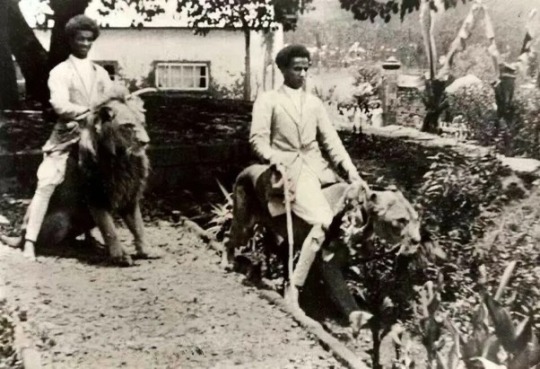
Meet his imperial majesty, the King of the Jungle.
And if, with his thick, shaggy mane Challa seems to have something of a frisky regal air about him - it's because he knows that he is a genuine blue blood.Challa is a direct descendant of Mochuria and Mollua - royal lions, which the late Emperor Haile Selassie kept as pets. The Emperor's practice of keeping pet lions is said to date thousands of years back to the Axumite period.Years ago in Ethiopia, Lions were pets to the people, some were used like donkeys, some like dogs kept at home. Emperor Haile Selassie of Ethiopia had lions he kept as pets, while some Ethiopians could even ride on them. These were not wild lions, they grew up with humans and became domesticated.They didn't go after human blood or other animals, lions roamed around the streets of Ethiopia and live was beautiful with them. Ethiopia is in East Africa, it's a rugged, landlocked country split by the Great Rift Valley, Ethiopia is a place of ancient culture, they believe and still hold on to ancient affairs.
Any lion that goes wild was immediately hunted killed, they were only killed if they kill a human and not animals like goats and chickens. They forbid killing and eating of any lion because lions were pets used in different palaces.
Ethiopia as a country had its origin in about 980 B.C., which makes it one of the oldest nations in the world.
Due to this very long history and an unmatched diversity of people and cultures, the country has often been described as a “museum of peoples”. With such a highly diverse population, Ethiopia houses an intricate tapestry of language and ethnic groups.
Also nicknamed the “Land of 13 Sunshine’s”, Ethiopia is often described as one of the most enthralling and enchanting places in the world – and definitely in Africa.
Ethiopia may not be the first place any traveller think of when planning or booking a next holiday, but it may just as well soon be the case. As African country Ethiopia can boast about having been at peace for at least the previous 15 years or more years and its economy is consequently one of the fastest growing in the world.
With the added bonus of an astounding diversity of landscapes, mixture of cultures and history that tracks back to when homo sapiens first started to raise itself up onto two legs, a traveller suddenly may look forward to a surprising and breath-taking travel destination.
But talking about planning and holiday dated, you probably didn’t know that this unique nation even has its own calendar?
This is but one of a myriad fascinating facts about the country, of which a number are discussed in this article. Looking at the country’s ancient and statutory history, its religion, culture, people and natural phenomena, here are at least 44 random but fascinating facts that you can ponder in anticipation of a visit to this eastern African country in the near future:
Fact number 1 – The oldest people in the world probably lived here.
Fact number 2 – Ethiopia is the oldest independent country in Africa and the only African country that could evade colonial rule.
Fact number 3 – Ethiopia was one of the first African forces to achieve a significant victory over a European colonial power.
Fact number 4 – Ethiopia has a rich history of rulers, including emperors and queens.
Fact number 5 – Ethiopia is perceived to be the diplomatic capital of the African continent
Fact number 6 – Ethiopia is the country with the second highest population in Africa, and with almost 1,5 % of the world population.
Fact number 8 – Ethiopia has the most orphans in the world.
Fact number 10 – Addis Ababa is the highest capital city in Africa.
Fact number 11 – More than 200 dialects are spoken by the peoples of the country.
Please like and share so others can see, drop your comments below and let me know what you think.
98 notes
·
View notes
Note
wait hiiiii hi hello bestie i didn’t know u like video essays!! i’ve been trying to find more to watch recently, do u have any other recs? about any topic 👀
HIIIIII bestie Robin, are you ready?? After harvesting my Youtube subscription and liked video lists here is what I have compiled. I'm gonna put my current top 5 video recommendations and then the rest of the list, under the cut, is organized by creator.
Why Are There So Many Confederate Vampires
The art of religious interpretation (midnight mass vs god’s not dead)
Defunctland: Walt Disney's City of the Future, E.P.C.O.T.
Hogwarts Legacy, JK Rowling, and Trans Advocacy
Cultural Inspirations in Avatar: The Last Airbender Book 1 - Water
CHANNELS
biz barclay - hilarious, brilliant, my best friend who drinks wine and weaves me long insightful stories while sitting on the dresser or in the bathtub. The vast amount of knowledge, historical
understanding snapewives: religion, fandom, sociology, & erotica
Goncharov (1973) video essay
The art of religious interpretation (midnight mass vs god’s not dead)
Xiran Jay Zhao - Author of one of my FAVE YA novels, “Iron Widow” (which is a MUST read). I always want more avatar content that focuses on cultural inspirations from trusted sources. Xiran taught me so much about the avatar universe I already loved as well as valuable critiques. They also do retellings of historical events such as- Bisexual Han Dynasty Emperors and Forgotten Warrior Queen - Fu Hao.
Cultural Inspirations in Avatar: The Last Airbender Book 1 - Water
Cultural Inspirations in Avatar: The Last Airbender Book 2 - Earth
Cultural Inspirations in Avatar: The Last Airbender Book 3 - Fire
Fundie Fridays - Jen, a leftist queer feminist, and her husband James examine different aspects of Christian fundamentalism, American conservative politics and pop culture. She has remade a lot of her older videos so make sure to watch the updated versions! She was also featured in the Amazon docuseries “Shiny Happy People” which I would HIGHLY recommend.
Vacation Bible School of Rock (3 part video series History of Contemporary Christian Music)
Ken Ham’s Creation Museum & Ark Encounter
Ask a Mortician - Caitlin Doughty!!! The adult Wednesday Addams we should have got. So compassionate, informed, and moving!! I love her work and she has taught me so much about what it means to have a relationship with death and grief. Her work deals with heavy topics and you can tell she does this work from a deeply respectful, informed place.
The Lake That Never Gives Up Her Dead
Let’s Visit the Churches Made of Human Skulls
Why are Black and White Funeral Homes STILL Separate? With Dr. Kami Fletcher
Iconic Corpse Series
Princess Weekes - Nuanced video essays on pop culture, race, feminism, and other social issues. Takes time to break down complex concepts, their origins and material consequences. The essay on confederate vampires and the connection later made to sci-fi media like Firefly were so paradigm shifting to me!
Why Are There So Many Confederate Vampires
The Magical Negroes of Stephen King
Ro Ramdin - Poetic, biting, and introspective essays on pop culture.
Do Celebrities Hate Their Fans? (Doja Cat, Frank Ocean)
Hogwarts Legacy, JK Rowling, and Trans Advocacy
DefunctLand- History of extinct theme parks and themed entertainment experiences.
Defunctland: Walt Disney's City of the Future, E.P.C.O.T.
Disney Channel’s Theme: A History Mystery
Mina Le - Fashion, movies and pop culture
WHY IS EVERYTHING SO UGLY: The Curse of Modernism
FAIRYTALE COSTUMES: it’s giving renfaire but why?
Quinton Reviews - Extensive videos covering niche topics, most popular for Nickelodeon deep dive retrospectives.
How Documentaries Lie to You
The ICarly/Victorious Saga Playlist
TheEpicNate315 - yea i fucking love endless hours of useless skyrim lore because the conspiracies are so deep and I have to do 0 of the research to get all of the information years of scouts worked to piece together!
The Skyrim Mysteries Iceberg (Part 1 of 4)
The Fallout Mysteries Iceberg (Part 1 of 2, incomplete series)
Mike’s Mic - Silly, goofy, and thorough breakdowns of nostalgic TV shows
Any of his unhinged recaps - LOST, Pretty Little Liars, Glee
Tiffanyferg - Media criticism and commentary
Internet Analysis Series
Zoë Ligon - sex educator, artist, and writer, who also owns SpectrumBoutique.com, a health and education oriented sex toy store. Such a special place in my heart for her!! Her bondage mini-documentary with Midori was so touching.
Sex Stuff | Japanese Rope Bondage with Midori
Channels Newer to Me
Broey Deschanel - a mixture of film analyses, retrospectives, politics and just absolutely overthinking anything to do with pop culture
Elvis (2022) and the Utter Mediocrity of Biopics
Meeptop - rambling about movies and stuff
Who is Dahmer Even Made For?
LadyJenevia - discussing entertainment media content including films, television series, etc. Expect to find reviews of recent cinematic releases, video essays on older releases, and interviews with talent from the film/television industry
Glass Onion: A Knives Out Mystery and The Art of Hiding in Plain Sight (Netflix Review/Video Essay)
As a disclaimer, I am not endorsing any creator fully and if you see someone you think I should not promote please reach out to me so I can edit this list. As a general rule of thumb the more I had to write about someone, the more informed the recommendation.
#if you read/watch this monster list thank you and I hope you enjoy!!#you can really see my niche interests displayed here lmao#send me asks if you have questions! or have recommendations for me!!#boybff reccomendations#video analysis#video essay reccomendations#video essay#YouTube recommendations
75 notes
·
View notes
Text
Inside the house of the king...
“Now it came to pass on the third day, that Esther put on her royal apparel, and stood in the inner court of the king’s house, over against the king’s house: and the king sat upon his royal throne in the royal house, over against the gate of the house.” (Esther 5:1, Authorized KJV)
“And above were costly stones, after the measures of hewed stones, and cedars. And the great court round about was with three rows of hewed stones, and a row of cedar beams, both for the inner court of the house of the LORD, and for the porch of the house.” (1 Kings 7:11-12, Authorized KJV)
“And he brought me into the inner court of the LORD’s house, and, behold, at the door of the temple of the LORD, between the porch and the altar, were about five and twenty men, with their backs toward the temple of the LORD, and their faces toward the east; and they worshipped the sun toward the east.” (Ezekiel 8:16, Authorized KJV)
#bible verse#bible study#king james version#authorized king james version#book of esther#esther 5#1 kings 7#the temple#sanctuary#power#authority#palaces#thrones#ezekiel 8#house of God#false worship#false gods#disobedience
1 note
·
View note
Text
LOST reading list
a list of books read by characters in lost for you to enjoy (or not). this isn't every book referenced in lost. for all that and more, see the "literary works" page on lostpedia, where im getting my info
no, my criteria for this list is that it's been read by a lost character. i'll tell you who (you'll see sawyers name a lot), and i'll add if it's somebody's fave book. this list will not include things like the bible or the qur'an or historical texts, as that while that can technically be recreational reading (it seems to be for ben), i'd rather not
Alice's Adventures In Wonderland by Lewis Carroll (read by Jack)
Are You There God? It's Me Margaret by Judy Blume (read by Sawyer)
A Brief History of Time by Stephan Hawking (read by Ben)
The Brothers Karamazov by Fyodor Dostoevsky (read by Ben)
Caravan of Dreams by Idries Shah (read by Ben)
Carrie by Stephen King (Read by Juliet, Ben and various other Others. This is Juliet's favourite book)
The Chosen by Chaim Potok (read by Sawyer)
Dark Horse by Tami Hoag (read by Jack)
The Dark Tower I: The Gunslinger by Stephen King (read by Ben)
Dirty Work by Stuart Woods (read by Jack)
Everything That Rises Must Converge by Flannery O'Connor (read by Jacob)
Evil Under The Sun by Agatha Christie (read by Sawyer)
Fahrenheit 451 by Ray Bradbury (read by Ben)
Flowers for Algernon by Daniel Keyes (read by Ben)
The Fountainhead by Ayn Rand (read by Sawyer)
Harry Potter and the Prisoner of Azkaban by JK Rowling (read by Jack)
Haroun and the Sea of Stories by Salmon Rushdie (read by Desmond)
Hotel by Arthur Hailey (read by Ben)
The Invention of Morel by Adolfo Bioy Casares (read by Sawyer)
Lancelot by Walker Percy (read by Sawyer)
Laughter in the Dark by Vladimir Nabokov (read by Hurley)
Notes from Underground by Fyodor Dostoevsky (read by Ilana)
The Oath by John Lescroart (read by Ben)
Of Mice and Men by John Steinbeck (read by Sawyer. This is Sawyer's favourite book and author)
Roots by Alex Haley (read by Ben)
A Separate Reality by Carlos Castaneda (read by Ben)
The Sheltering Shy by Paul Bowles (read by Ben)
Ulysses by James Joyce (read by Ben)
Valhalla Rising by Clive Cussler (read by Ben and Jack)
VALIS by Philip K. Dick (read by Ben)
Watership Down by Richard Adams (read by Boone and Sawyer)
A Wrinkle In Time by Madeleine L'Engle (read by Sawyer)
Every work by Charles Dickens other than Our Mutual Friend (read by Desmond. This is his favourite author)
I encourage you to speculate on the character implications put forth by these reading choices. This can raise such questions as: Jack is a Harry Potter fan? What is Desmond's favourite book by Charles Dickens? Boone can read??
Thank you for your time
#wow this really isn't light reading. here have some complex serious shit#sawyer and ben and jack are dominating the list. nerds#anyways im not exactly recommending these books#especially since it includes books by ayn rand and jk rowling [gags]#and also i don't even know what most of these are#but it's neat to have it listed as trivia at least. and might be useful for character analysis#note that sawyer didnt choose most of his books#but everybody else chose their books#also at a certain point while making this list i was begging ben to stop reading
51 notes
·
View notes
Text

Discovering the Power of God's Word:
A Journey Through Scripture
Introduction:
Embark on a captivating journey through the timeless wisdom and power of God's Word as we delve into the pages of Scripture. Join us as we uncover the transformative truths, hidden treasures, and life-changing promises waiting to be revealed in the King James Version of the Bible.
Scripture Passage: Psalm 119:105 (KJV)
Cross References: 2 Timothy 3:16-17, Hebrews 4:12, James 1:22-25
Commentary:
In Psalm 119:105, the psalmist declares, "Thy word is a lamp unto my feet, and a light unto my path." The Word of God serves as a guiding light, illuminating our way and directing our steps in the midst of darkness and uncertainty.
2 Timothy 3:16-17 affirms the divine inspiration and authority of Scripture, declaring that all Scripture is given by inspiration of God and is profitable for doctrine, for reproof, for correction, for instruction in righteousness, that the man of God may be perfect, thoroughly furnished unto all good works.
Hebrews 4:12 describes the Word of God as living and powerful, sharper than any two-edged sword, piercing even to the division of soul and spirit, and of joints and marrow, and is a discerner of the thoughts and intents of the heart. It penetrates deep into the innermost recesses of our being, exposing truth and bringing transformation.
James 1:22-25 admonishes believers not only to be hearers of the Word but also doers, for blessed are those who hear the Word and obey it. The Word of God is likened to a mirror, reflecting our true spiritual condition and revealing areas in need of alignment with God's will.
John 15:1-17 - Jesus' teaching on abiding in Him as the vine and bearing fruit.
Colossians 3:12-17 - Paul's exhortation to clothe ourselves with virtues such as kindness, humility, and forgiveness.
Matthew 7:16-20 - Jesus' teaching on recognizing false prophets by their fruits.
Ephesians 5:9 - Paul describes the fruit of the Spirit as being in all goodness, righteousness, and truth.
Matthew 12:33 - Jesus speaks about how a tree is known by its fruit.
James 3:17-18 - James describes the wisdom from above as being pure, peaceable, gentle, and full of good fruits.
Proverbs 11:30 - "The fruit of the righteous is a tree of life; and he that winneth souls is wise."
Psalm 1:3 - "And he shall be like a tree planted by the rivers of water, that bringeth forth his fruit in his season; his leaf also shall not wither; and whatsoever he doeth shall prosper."
Galatians 5:16-26 - The contrast between the works of the flesh and the fruit of the Spirit.
Luke 6:43-45 - Jesus' teaching on how a good tree brings forth good fruit, and an evil tree brings forth evil fruit.
These cross-references provide additional insights and perspectives on the fruit of the Spirit, encouraging further study and reflection on this vital aspect of the Christian life.
Questions:
How does the Word of God guide and illuminate your path in life?
In what ways do you actively engage with Scripture to experience its transformative power?
How can you apply the truths and principles found in God's Word to your everyday life and decision-making?
What steps can you take to deepen your understanding and appreciation of the King James Version of the Bible?
Prayer:
Heavenly Father, we thank you for the gift of your Word, which is a lamp to our feet and a light to our path. Open our hearts and minds to receive the truths and promises contained within its pages, and empower us to live according to your will. May your Word dwell richly in us, guiding, transforming, and renewing us day by day. Amen.
#faith#christianity#christian faith#bible#jesus christ#faith in jesus#bible scripture#christ#bible verse#christianlife#Scripture#BibleStudy#KJV#TransformativePower#DivineInspiration#Guidance#Truth#Light#Wisdom#daily bible verse#bible study#holy bible#christianty#christian blog#god words#godspromises#god is good#godismyshepherd#godsprovision#godsword
19 notes
·
View notes
Text
"In 1946, the term 'homosexuals' appeared for the first time in an English Bible. This new figure appeared in a list of sinners barred--according to a verse in the Apostles Paul's first epistle to the Corinthians--from inheriting the kingdom of God. The word change was made by leading Bible scholars, members of the translation committee that labored for over a decade to produce the Revised Standard Version (RSV) of the Bible. With an approach inspired by text-critical scholarship, many of their choices upset readers of the older King James Version, the favored Bible of Protestant America since the colonial era. Amid the outrage over other changes--to the red-letter words of Jesus and the old Shakespearean idiom--another modernizing innovation went virtual unremarked. Two enigmatic Greek nouns, referenced in the King James as 'effeminate' and 'abusers of themselves with mankind,' now appeared as a single, streamlined 'homosexual.' Subsequent Bible commentaries approached the new term as age-old tradition...
Some Bible readers, however, responded with surprise to this textual change. In everyday use, the verse in I Corinthians had other meanings. The author of a 1956 advice book on how to write sermons recounted the embarrassing tale of one minister's well-loved sermon. That sermon, delivered on various occasions, expanded on the 'general meaning' of the Apostle Paul's reference to the 'effeminate,' which the pastor took as warning against 'the soft, the pliable, those who take the easy road.' The take-away point was that Christians must undertake the difficult path of faith. It was a fine sermon, or so the pastor thought, until he read the RSV. He discovered 'to his amazement and chagrin; that 'effeminate' was translated 'homosexuals.' The confusion was a lesson, the author of this advice book chided, on the need to use recent translations. A check through earlier Bible commentaries confirms that outdated reference tools may indeed have contributed to this pastor's error. An eariler edition of The Interpreter's Bible, published in 1929, said nothing at all about homosexuality in its commentary on the same verse in I Corinthians. It noted that the Apostle Paul was keenly aware of the 'idolatry and immorality' of the pagan world. However, the named vice that so perturbed the apostle was 'self indulgence of appetite and speech,' an interpretation that more readily fit with the pastor's call to a disciplined faith. If Christianity did indeed set itself against homosexuality from the first, then this popular Christian reference text neglected to make that prohibition clear.
Several scholars of American religion have puzzled over the peculiar silences of early twentieth-century Christian texts on the topic of same-sex sexuality. After surveying the published Christian literature of that time, Randall Balmer and Lauren Winner concluded that during those decades, 'the safest thing to say about homosexuality was nothing.' They note that even the published commentary on 'sodomy,' which would seem to be the clearest antecedent to later talk about homosexuality, yielded little that would illumine a long tradition of same-sex regulation. Although many Bible reference tools mentioned that damnable 'sin of Sodom,' the muddled and circular commentary on this 'loathsome vice' offered little that clarified its nature. Historian Rebecca Davis, on her own hunt to find Christian teachings about homosexuality, similarly notes the profound absence in early and mid-twentieth century Protestant literature--and especially in the writing by conservative fundamentalists. 'The extant printed record,' she observes, 'suggests that they avoided discussions of homosexuality almost entirely.' Adding further substance to this void are the findings from Alfred Kinsey's study of the sexual behavior of white American men, conducted between 1936 and 1946. The study suggested that Christians, although well acquainted with the sinfulness of masturbation and premarital intercourse, knew very little about what their churches had to say about same-sex acts. 'There has not been so frequent or so free discussion of the sinfulness of the homosexual in religious literature,' Kinsey wrote. 'Consequently, it is not unusual to find even devoutly religious persons who become involved in the homosexual without any clear understanding of the church's attitude on the subject.' Before the 1940s, the Bible's seemingly plain condemnation of homosexuality was not plain at all.
...
What this book [Reforming Sodom] shows is that the broad common sense about the Bible's specifically same-sex meaning was an invention of the twentieth century. Today's antihomosexual animus, that is, is not the singular residue of an ancient damnation. Rather, it is the product of a more complex modern synthesis. To find the influential generators of that synthesis, moreover, we should look not to fundamentalist preachers but to their counterparts. Religious liberals, urbane modernizers of the twentieth century, studiously un-muddled the confused category of 'sodomitical sin' and assigned to it a singular same-sex meaning. The ideas informing this shift germinated out of the therapeutic sciences of psychiatry and psychology, an emerging field of the late nineteenth century that promised scientific frameworks for measuring and studying human sexual behavior. Liberal Protestants were early adopters of these scientific insights, which percolated through various early twentieth-century projects of moral reform. Among the yield from the convivial pairing of medicine and morality was the midcentury translation of the RSV. The newly focused homosexual prohibitions evidenced the grafting of new therapeutic terms onto ancient roots. The scores of subsequent Bible translations produced in later decades adopted and sharpened the RSV's durable precedent. In the shelves of late twentieth-century translations and commentaries--none more influential than the 1978 New International Version, which quickly displaced the King James as America's best-selling Bible--American Christians read what might be called a 'homosexualized' Bible. Instead of the archaic sinners and enigmatic sodomy talk found in the King James, these modern Bibles spoke clearly and plainly about the tradition's prohibition against same-sex behavior. The subsequent debate about the implications of these self-evident meanings overlooked a nearly invisible truth: the Bible's plain speech about homosexuality issued from a newly implanted therapeutic tongue."
Heather R. White, Reforming Sodom: Protestants and the Rise of Gay Rights
21 notes
·
View notes